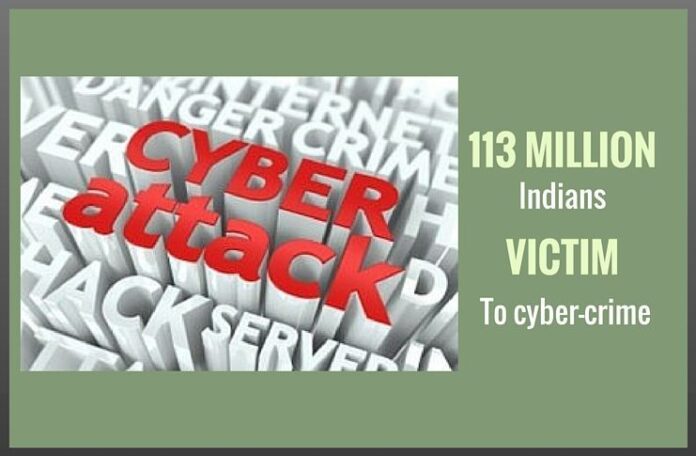
[dropcap color=”#008040″ boxed=”yes” boxed_radius=”8px” class=”” id=””]A[/dropcap]n estimated 113 million Indians, or 48 percent of Indians online, fell victim to cyber-crime last year, a report by American software security firm Norton said on Thursday.
Indian victims lost about Rs.16,558 [$250.05]on an average, as compared to the global average loss figure of Rs.23,878 ($360.61), according to the survey by Norton by Symantec that “explores the emotional side of cyber-crime”, Norton officials said.
“Cyber-crime takes a true emotional toll. Close to 8 in 10 said they would feel devastated if their personal financial information is compromised while 36 percent said they felt sad after being affected by online crimes compared with 19 percent globally,” Norton India country manager Ritesh Chopra said.
“Our findings reveal that consumer reservations are indeed grounded in reality. In the past year, 48 percent of India’s online population or approximately 113 million Indians were affected by online crimes,” he said.
Indian consumers affected by cyber-crime lost on average 29.6 hours compared to an average of 21 hours across the 17 countries surveyed.
The “Norton Cybersecurity Insights Report”, covering 17,125 device users aged 18 plus, comprised inputs from 1,000 people from India.
At least 66 percent of Indian respondents (compared to 60 percent globally) felt that using public Wi-Fi is riskier than using a public washroom.
The report said 60 percent of people worry about experiencing cyber-crime.
[dropcap color=”#008040″ boxed=”yes” boxed_radius=”8px” class=”” id=””]I[/dropcap]nterestingly, 54 percent of Indians believe it is more likely that their credit card information will be stolen online than from their wallet and one in two (52 percent) have either personally experienced credit card fraud or know someone who has.
The survey found that “baby boomers”, defined as 55 years, a group often perceived as less tech savvy, have more secure online habits than the “millennials” – born between the 1980s to early 2000.
“Millennials, born in the digital era, often throw caution to the wind, with 31 percent admitting to sharing passwords and other risky online behaviour,” Chopra said.
“More than seven in 10 millennials in India have experienced a form of cyber-crime, with every second millennial experiencing it in the last 12 months alone,” he said.
“Also, 32 percent Indians (driven mostly by millennials) reported having their mobile device stolen, compared with the global average of 15 percent,” Norton said in a statement.
Highlighting the risky behaviour especially among India’s “millennials”, the survey found people sharing passwords to online sensitive accounts with friends and family.
“Of those sharing passwords, more than one in three share the password to their banking account, and on an average they are sharing passwords for two accounts, with the most common passwords shared being email (60 percent), and social media (54 percent),” Norton said.
“Millennial Indians are at higher risk, with more than one in two users personally experiencing a form of online crime in the last 12 months alone,” it added.
The report was commissioned by Norton by Symantec and produced by research firm Edelman Berland.
Note:
1. Some of the content is from IANS
2. The conversion rate used in this article is 1 US Dollar = 66.21 Rupees.
- Pentagon cancels aid to Pakistan over record on militants - September 2, 2018
- The curious case of Tamil Nadu’s opposition to NEET - September 4, 2017
- If 2.6 Billion People Go To War: India vs. China - July 22, 2017










